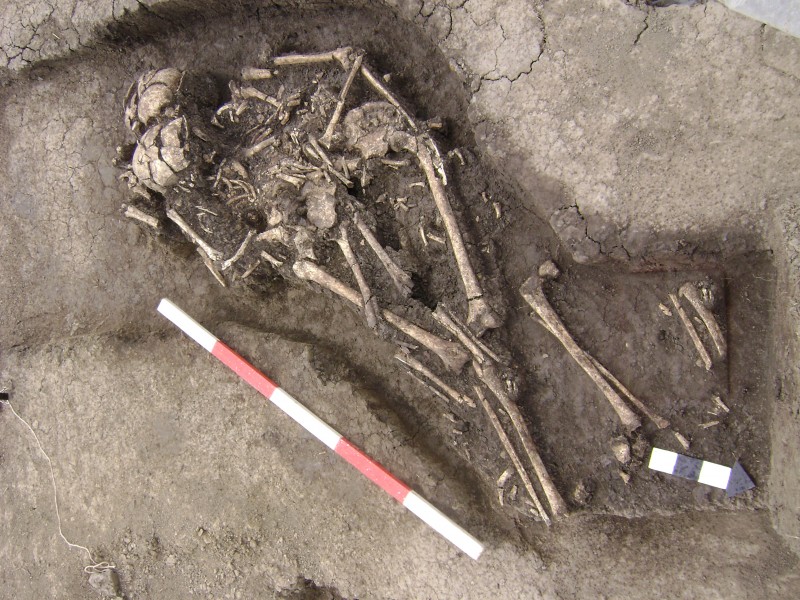Fieldwork

Location: Valeni, RO
Season: June 8, 2025 to August 2, 2025
Session Dates: Session 1: June 8- July 5, Session 2: July 6 - August 2, 2025
Application Deadline: May 1, 2025
Deadline Type: Exact Date
Website: https://www.archaeotek-archaeology.org/medieval-cemetery-funerary-excavation
Program Type:
Field School, Volunteer
RPA Certified:
No
Affiliation:
University of South Florida and Western Carolina University (USA); Bio/Archaeological Techniques and Research Center (BioArch Canada); Haaz Rezso Muzeum (Romania)
Project Director:
Dr. Katie Zejdlik-Passalacqua (Western Carolina University); Dr. Stephen Batiuk (BioArch Canada); Dr. Zsolt Nyaradi (Haaz Rezso Muzeum)
Project Description:
At the end of the 17th century, several churches around Odorheiu Secuiesc (Transylvania, Romania) have been abandoned. What is even more interesting is that those churches were removed from collective memory as well. Not only the written records pertaining to these churches were lost, but the local communities forgot about their existence. Our excavation aims to retrieve the memory of these churches and to try to elucidate the social, political, and religious context that created such an environment that would extract a church from local collective memory.
In 2014, we have started exploring the skeletal assemblage of the “lost church” of Valeni, with outstanding results We have discovered an early medieval and a Gothic church, but the stratigraphy indicates that there is an even earlier church that we have not yet identified. The most surprising result of our campaigns is the presence of what appears to be a migration period, a pre-Christian tumulus under the church, as indicated by the burial of a horse associated with several individuals buried in fetal position. These results could also shed light on the Christianizing processes in the region as well as the relationship between the various churches and their subsidiaries. Through a more thorough study of the cemeteries and their occupants, we will also explore the different processes that led to the penetration of Protestantism in the region and then its subsequent return to Catholicism. In 2025, we will continue exploring the medieval cemetery of our “lost church”, expanding our excavation beyond the initial walls of the cemetery itself.
Our excavation will deploy a bioarchaeological field approach. Within this context, we will concentrate our work on the individuals themselves and their immediate surroundings (i.e. clothing implements, jewelry, coffin and other primary funerary depositions. During one session of the excavation, we expect each participant to fully excavate a minimum of two individuals. All participants will receive basic training in human anatomy and morphology in order to fully take advantage of the opportunities presented during excavation.
Period(s) of Occupation: Middle Ages
Notes:
Funerary excavation of a well-preserved medieval church cemetery dating from one of the most tumultuous periods in the history of Transylvania (Romania).
Two separate four-week sessions are available.
Session 1: June 8- July 5, 2025
Session 2: July 6 - August 2, 2025
Project Size: 1-24 participants
Minimum Length of Stay for Volunteers: 4 weeks
Minimum Age: 18
Experience Required: No bioarchaeological field experience is required. Basic knowledge of human anatomy and morphology is preferred but not required.
Room and Board Arrangements:
Students and volunteers will be housed in Odorheiu Secuiesc, a small and beautiful city, rich in history and culture. It is a cosmopolitan town, situated in central Transylvania. Participants will be housed in double or triple occupancy rooms within 45min walking distance from downtown Odorheiu Secuiesc (or a 10min cab ride). A bus will be rented to take us into the field and back daily. Breakfast and dinner will be served Mon-Fri in the hotel restaurant. Participants will sample a variety of amazing home-cooked Romanian and Szekler traditional meals. Students and volunteers are responsible for their own lunches in the field. Beware that Romanian cuisine is meat-oriented, but we do our best to accommodate vegetarian dietary requirements (however, we are unable to offer a vegan or gluten-free meal option). There are plenty of small stores, supermarkets, farmer's markets, where you can purchase fresh cheese, various meat products, garden vegetables, bread, drinks, and anything else you might need. Odorheiu Secuiesc provides all the amenities of a small European city, which includes hospitals an international bus station, a train station, and all the stores you might need. Program cost: $2895 per 4 week session (additional USF tuition fees apply, only if registering for credit)
Academic Credit:
3-6 undergraduate/graduate academic credit available, if interested, through the University of South Florida. Contact directly University of South Florida (Education Abroad) for details.
Dr. Katie Zejdlik or Dr. Stephen Batiuk
Ohio State University
Columbus
The AIA is North America's largest and oldest nonprofit organization dedicated to archaeology. The Institute advances awareness, education, fieldwork, preservation, publication, and research of archaeological sites and cultural heritage throughout the world. Your contribution makes a difference.
Notifications